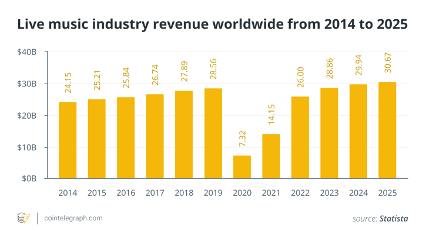It is inevitable to admit the fact that Covid-19 has triggered a number of changes in our daily lives. Suddenly, we have become accustomed to not carry cash, to wash our hands more often, and even, on some days, to work from home instead of going to the office. And many of these changes are here to stay.
An industry the size of the music industry was not going to be slow to adapt. Global music industry revenues plummeted by more than $21 billion in 2022 compared to the previous year. Not even this year, these revenues have matched the 2019 figure. However, a recovery in the music industry is expected by 2023. Given this huge gap, how is such a rapid recovery possible?
(Fig.1) Live music industry revenue worldwide from 2014 to 2025.
One of the answers is the Metaverse. This year we have been able to observe the presence of musical experiences through this medium. Justin Bieber performed a show in 2021 on the Wave platform. Warner Music Group, one of the biggest companies in the world, has bought land in the Metaverse for the creation of a music theme park. In fact, the VMAs (MTV Video Music Awards) have added a new category to their awards: “Best Metaverse Performance”.
Now, given that the metaverse is set to establish itself in our way of conceiving the world, let’s briefly discuss some of the pros and cons of the music shows in the metaverse.
Shows in the metaverse have several advantages for both the audience and the artists themselves.
First of all, accessibility, both physically and financially. Front row seats at a virtual Rolling Stones concert can be cheaper than travelling to see them in person. In addition, it will allow you to get on stage, interact with the rest of the audience and even with the singer him/herself. As far as the artist is concerned, touring in the metaverse is less expensive both physically and financially, especially in smaller cities that don’t have enough fans to make the effort worthwhile.
However, a few rights complications are emerging, creating a deeper division between copyright, musicians’ rights and related rights. In fact, the NMPA is suing Roblox for $20 million for streaming music on its platform.
In my opinion, incorporating concerts into the metaverse can be beneficial in many ways, but even so, I’ll always go for the throbbing of the speakers in my chest, the jostling, the contact with other sweaty bodies and coming back home with your favourite t-shirt full of beer. What do you guys think?
Bibliography:
(Fig.1) Live music industry revenue worldwide from 2014 to 2025. Recovered from (28/10/2022): https://www.statista.com/statistics/1096424/live-music-industry-revenue-worldwide/
P. J. P. B. F. (s. f.). Música en el metaverso: las controversias que enfrentará la industria. LexLatin. Recuperado 28 de octubre de 2022, de https://lexlatin.com/opinion/musica-en-el-metaverso-las-controversias-que-enfrentara-la-industria

